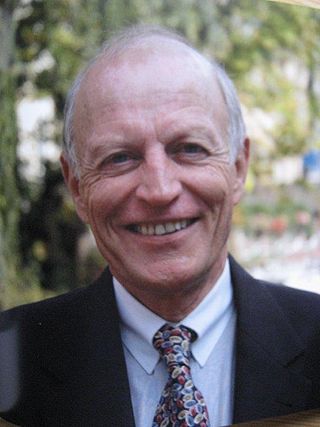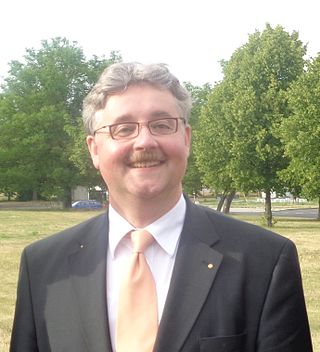Related Research Articles

Aryanization was the Nazi term for the seizure of property from Jews and its transfer to non-Jews, and the forced expulsion of Jews from economic life in Nazi Germany, Axis-aligned states, and their occupied territories. It entailed the transfer of Jewish property into "Aryan" or non-Jewish, hands.
Friedrich Blume was professor of musicology at the University of Kiel from 1938 to 1958. He was a student in Munich, Berlin and Leipzig, and taught in the last two of these for some years before being called to the chair in Kiel. His early studies were on Lutheran church music, including several books on J.S. Bach, but broadened his interests considerably later. Among his prominent works were chief editor of the collected Praetorius edition, and he also edited the important Eulenburg scores of the major Mozart Piano Concertos. From 1949 he was involved in the planning and writing of Die Musik in Geschichte und Gegenwart.
Leonore Siegele-Wenschkewitz was a German church historian and director of the Evangelische Akademie Arnoldshain. She was co-editor of the journal Kirche und Israel and of the issue Arbeiten zur kirchlichen Zeitgeschichte. She was known for her work on anti-Jewish tendencies in Christian theology.

Horst Möller is a German contemporary historian. He is Professor of Modern History at the Ludwig Maximilian University of Munich (LMU) and, from 1992 to 2011, Director of the Institut für Zeitgeschichte.
Helmut de Boor was a German medievalist.

Dieter Mahncke is a scholar of foreign policy and security studies, and Alfried Krupp von Bohlen und Halbach Professor Emeritus of European Foreign Policy and Security Studies at the College of Europe. He is the author of books and articles on European security, arms control, German foreign policy, Berlin, US-European relations and South Africa.
Michael Schmaus was a German Roman Catholic theologian specializing in dogmatics.
Felix Stähelin was a Swiss historian of Basel.
Bernhard Schweitzer was a German classical archeologist.
Winfried Baumgart is a German historian. His work has a particular focus on German history during the nineteenth century and the opening decades of the twentieth century. His bibliographical directory of Germany history, which first appeared in 1971, proved sufficiently popular to reach 16 editions by 2006.
Friedrich Lütge was a German economist, social historian and economic historian.
Michael Buddrus is a German historian.
Karin Orth is a German historian, known for her research into the Nazi concentration camps.
Anton Schindling was a German historian. He held chairs at the Catholic University of Eichstätt-Ingolstadt (1985–1987), the University of Osnabrück (1987–1995) and the University of Tübingen (1995–2015). Thematically he worked on the history of education, the age of Confessionalization and the Holy Roman Empire. He was one of the leading early modern researchers in Germany.
Johannes Kunisch was a German historian. He held chairs of early modern history at the Goethe University Frankfurt. (1972-1976) and the University of Cologne (1976–2002). Through his publications Kunisch became one of the leading German early modern historians. His biography Frederick the Great, published in 2004 and widely acclaimed, gave lasting impulses to Prussian research.

Matthias Stickler is a German historian.

Ewald Grothe is a German historian. Since 2009 he has been an extraordinary professor at the Bergische Universität Wuppertal and since 2011 he has been head of the Archive of Liberalism of the Friedrich Naumann Foundation for Freedom in Gummersbach.
Kerstin Susanne Jobst is a German historian and professor. Since 2012 she has taught at the Institute for East European History at the University of Vienna.

Michael Stolleis was a German jurist and historian. He was a law professor at Goethe University Frankfurt until 2006 and directed the Max Planck Institut für Europäische Rechtsgeschichte of the Max Planck Society from 1991 to 2009.

Eberhard Hermann Erich Zeidler was a German mathematician, who worked primarily in the field of non-linear functional analysis.
References
- 1 2 "Prof. Dr. Ulrich von Hehl". Historisches Seminar ... Forschungsschwerpunkte: Geschichte des Nationalsozialismus, Geschichte der Weimarer Republik und des Kaiserreichs, Universitätsgeschichte, Stadtgeschichte Leipzigs, Katholizismusforschung. Universität Leipzig (Dekanat der Fakultät für Geschichte, Kunst- und Orientwissenschaften). Retrieved 4 March 2016.
- ↑ "Works by and about Ulrich von Hehl". Katalog der Deutschen Nationalbibliothek. Deutsche Nationalbibliothek, Frankfurt am Main. Retrieved 4 March 2016.
- ↑ "Internationaler Editorial Board - SZRKG: Prof. Ulrich von Hehl". Universität Freiburg Schweiz (Zeitschrift für Schweizerische Kirchengeschichte (ZSKG) / Schweizerische Zeitschrift für Religions- und Kulturgeschichte (SZRKG)). Retrieved 4 March 2016.
- 1 2 "Prof. Dr. phil. habil. Ulrich von Hehl" (PDF). Catalogus Professorum Lipsiensium. Universität Leipzig. Retrieved 4 March 2016.
- ↑ Hehl, Ulrich von (1977). Katholische Kirche und Nationalsozialismus im Erzbistum Köln 1933–1945. ISSN 0341-289X.
{{cite book}}:|work=ignored (help) - ↑ "Organisation" (PDF). Kommission für Zeitgeschichte, Bonn. Retrieved 4 March 2016.
- ↑ Hehl, Ulrich von (1987). Wilhelm Marx 1863–1946. Eine politische Biographie.
{{cite book}}:|work=ignored (help) - ↑ "Der Lehrstuhl für Neuere und Neueste Geschichte wird mit der Emeritierung von Prof. von Hehl zum 01.04.2013 aufgelöst". Universität Leipzig. 1 October 2014. Retrieved 4 March 2016.
- ↑ "... Prof. Dr. Ulrich von Hehl". Die Herausgeber der Wissenschaftlichen Stadtgeschichte ... Der Oberbürgermeister i.A. Stadt Leipzig. Retrieved 4 March 2016.